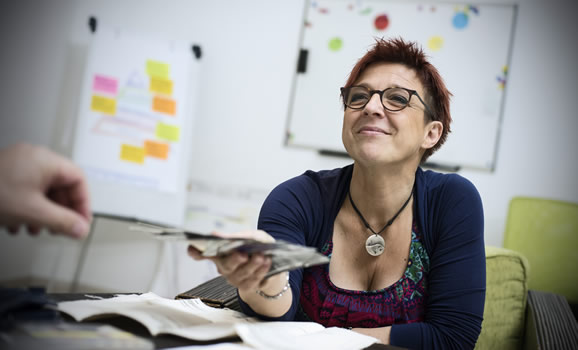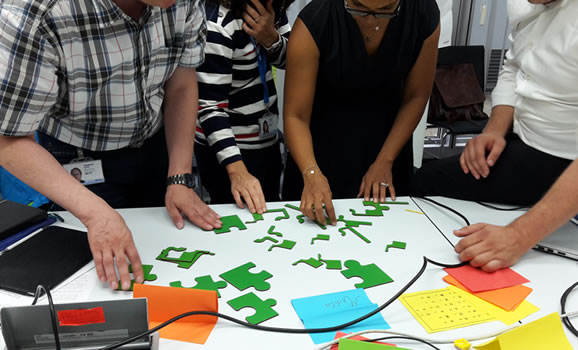Facilitation
Do your meetings get where they aim for? Or they too often seem to just “happen” to you? Are you eager to be there, inspired to contribute or it seems like a burden of just another lost hour (or more)?
One of my strongest beliefs, and also one of the most important guiding principles in my work is that EVERY conversation is an opportunity for breakthrough.
That it is possible to engage a large number of people in effective conversation that leads to results. That our ability to harvest the totality of our organisation’s wisdom is one of the keys to bring about sustainable change.
Thus in a way, my work has become a quest for the skills and tools for harvesting the intelligence of the whole. Encouraging organisations to dare to invite more people in the room, ask the big questions that need to be asked and engage in finding the answers together. Designing environments that allow multiple stake-holders to explore critical themes and find solutions for complex business and organizational challenges together - buy owning and effectively harvesting their meetings.
The secret lies in:
- Clarity in purpose
- Well framed invitation
- “Right” participants
- Effective process design
- Skilful hosting and facilitation
- Good harvest
- And after the meeting – commitment to follow-through
This is what you get when you partner with me as facilitator:
- I help you gain clarity on what is (and what is not) the quest behind your call, what you want the meeting to achieve, who should (and who should not) be invited
- I help you frame the invitation
- We plan together what needs to be harvested from the workshop
- We plan the overall meeting flow
- I design the details of the process and all support tools
- I host and facilitate the meeting (and I rarely do it alone) *
- I compile the harvest report
Why facilitation
Effective facilitation skills have become critical to create the space for meaningful discussion, empowerment and collaborative decision making within today's fast paced, resource poor and complex organisational environments. "Business as usual" meeting strategies are no longer appropriate to generate solutions to complex problems involving multiple stakeholders and competing interests.
Social research consistently proves that people are more committed to the ideas and plans that they have participated in creating. Collaborative groups with equal participation among all group members (rather than a few subject matter experts dominating) produce better results. The reason? Such groups consider multiple perspectives, and generate more creative and effective results.
Skilled facilitators are effective leaders, capable of not only designing and leading focused, positive and productive meetings. They foster creativity, enable ownership and alignment to new directions, and help build the commitment required for successful implementation of ideas and solutions.
The Role of Facilitation in large scale processes
Implementing systemic sustainable change in organisations is an integral process that involves many challenges: transforming strategies, processes and mind-sets across all levels of the organisation.
In large-scale transformations one of the biggest challenges is bringing together large groups of people in meaningful conversation, that will result with bottom line business impact - through engagement, ownership, commitment and accountability of all stakeholders.
Being faced with the need to re-design our world can feel rather overwhelming. It can create resistance, chaos and confusion that challenges the capacity of people involved to lead their conversations in an effective way.
That is when an external, skilful facilitator can make a difference When mutual understanding, partnership and/or collaborative action are the desired outcomes of a meeting involving multiple views, knowing how to design and facilitate an appropriate flow for meaningful conversations is essential.
How We Do It
By blending different conversation methods to achieve mutual understanding, reframe conflict, and generate novel solutions that bridge diverse system needs.
Methodology includes:
- Facilitation grounded in Team coaching and Art of Hosting principles - proven participatory methods for breakthrough thinking, decision-making and collaborative action (World Café, Dialogue, Appreciative Inquiry, Design for Wiser Action … )
- Integrated participative processes, methods & tools designed to engage the team in meaningful conversation, deliberate collaboration, and group-supported action for the common good (Open space, Circle, Pro-Action café …)
- Team conversations supported by principles that maximize collective intelligence, welcome diverse viewpoints, maximize participation and transform conflict into creative cooperation
Leadership in complexity requires different skills than traditional models of leadership. It requires us to think of leadership as inquiry, and this in turn means that we need to think much more critically about the kinds of questions that we ask. It may not be the answers that need changing, but the questions.”
Brenda Zimmerman



